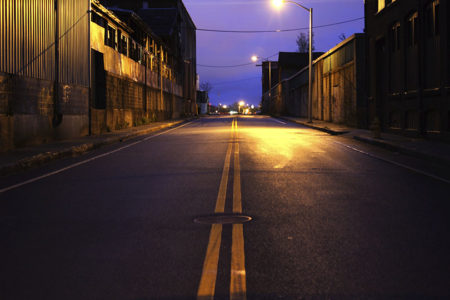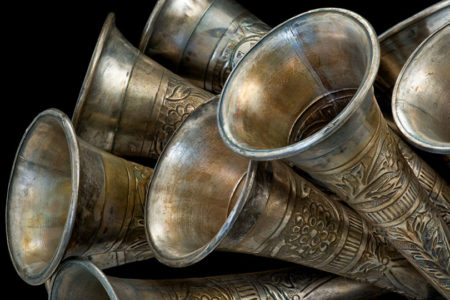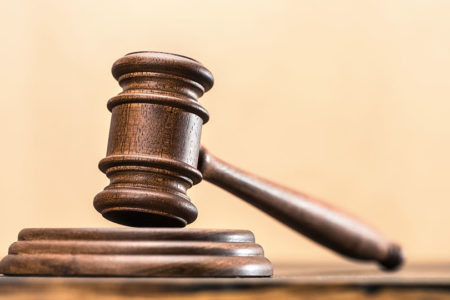Prophets Among Them
In the midst of the future Tribulation, as the Lord batters Earth with judgment after judgment, two extraordinary men will appear in Jerusalem. The Bible says they will have amazing powers, enabling them “to shut heaven, so that no rain falls in the days of their prophecy: and they have power over waters to turn them to blood, and to strike the earth with all plagues, as often as they desire” (Rev. 11:6).
These judgments have been seen before when God used Moses to turn the Nile River to blood prior to the Exodus (Ex. 7:19–21) and when the prophet Elijah shut the heavens so there was no rain in the days of evil King Ahab (1 Ki. 17:1–16). Consequently, many identify these two witnesses as Moses and Elijah; but the Bible does not say who they are.
It does say, “If anyone wants to harm them, fire proceeds from their mouth and devours their enemies”—something that did not occur with either Moses or Elijah (Rev. 11:5). The witnesses “will prophesy one thousand two hundred and sixty days, clothed in sackcloth” (v. 3). Their prophetic ministry will last for 42 months, or half of the seven-year Tribulation. And, like the Jewish prophet Ezekiel, they will be testimonies to the fact that God never leaves this world bereft of truth.
“These are the two olive trees and the two lampstands standing before the God of the earth,” the Lord says, referring to these men (v. 4).
Thousands of years earlier, the prophet Zechariah received a vision involving olive trees and lampstands. He was awakened by an angel who asked,
“What do you see?” So I said, “I am looking, and there is a lampstand of solid gold with a bowl on top of it, and on the stand seven lamps with seven pipes to the seven lamps. Two olive trees are by it, one at the right of the bowl and the other at its left.” So I answered and spoke to the angel who talked with me, saying, “What are these, my lord?” (Zech. 4:2–4).
Zechariah was confused, and the angel seemed surprised the prophet did not grasp the intent of the vision. So he explained: “These are the two anointed ones, who stand beside the Lord of the whole earth” (v. 14). The two here were Zerubbabel (heir to the throne of David) and Joshua, son of Jehozadak the high priest. They were the “olive trees” that produced oil that was carried by the pipes to the golden lampstand to bring light to a lost world. In other words, they were conduits of the Holy Spirit.
This is the same imagery of Revelation 11. The two witnesses are on Earth to bring light to the dark and dying world experiencing Almighty God’s holy wrath.
At the end of the 42 months, the Antichrist “will make war against them, overcome them, and kill them. And their dead bodies will lie in the street of the great city [Jerusalem]” (Rev. 11:7–8). People the world over will “see their dead bodies three-and-a-half days, and not allow their dead bodies to be put into graves. And those who dwell on the earth will rejoice over them, make merry, and send gifts to one another, because these two prophets tormented those who dwell on the earth” (vv. 9–10).
Despite horrific, daily judgment, most of mankind will still reject God and His way of salvation. In a final attempt to show people that the witnesses were true prophets, the Lord will miraculously resurrect them after their decomposing bodies lay in the street almost four days:
Now after the three-and-a-half days the breath of life from God entered them, and they stood on their feet, and great fear fell on those who saw them. And they heard a loud voice from heaven saying to them, “Come up here.” And they ascended to heaven in a cloud, and their enemies saw them. In the same hour there was a great earthquake, and a tenth of the city fell. In the earthquake seven thousand people were killed, and the rest were afraid and gave glory to the God of heaven (vv. 11–13).
God always reaches out to lost humanity and will continue to do so even during the bleak and awful days of the Tribulation. Some people will come to believe in Him then, but most will not. However, God will not leave them without a witness. As He told Ezekiel in exile in Babylon after the destruction of the first Temple in 586 B.C., “As for them, whether they hear or whether they refuse…they will know that a prophet has been among them” (Ezek. 2:5).







